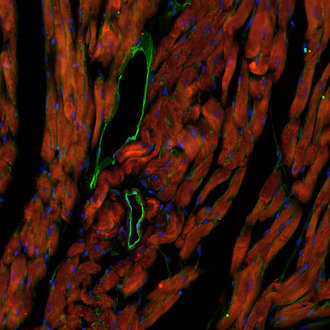
| Cat. No. HS-511 008 |
50 µg purified recombinant IgG, lyophilized. Albumin and azide were added for stabilization. For reconstitution add 50 µl H2O to get a 1mg/ml solution in PBS. Then aliquot and store at -20°C to -80°C until use. Antibodies should be stored at +4°C when still lyophilized. Do not freeze! |
| Applications | |
| Clone | RbDeu10 |
| Subtype | IgG1 (κ light chain) |
| Immunogen | Purified porcine Desmin (UniProt Id: P02540) |
| Reactivity |
Reacts with: mouse (P31001), human (P17661), rat (P48675). Other species not tested yet. |
| Remarks |
This antibody is a chimeric antibody based on the monoclonal mouse antibody DE-U-10. The constant regions of the heavy and light chains have been replaced by rabbit specific sequences. The antibody can therefore be used with standard anti-rabbit secondary reagents. The antibody has been expressed in mammalian cells. |
| Data sheet | hs-511_008.pdf |

Expression of Desmin in cardiomyocytes (red) and CD31 in vascular endothelial cells (green) in a mouse heart.
Desmin is the most important muscular intermediate filament (IF) and is expressed in cardiac, skeletal and smooth muscles. Desmin IFs envelop myofibrils at the level of Z-disks and extend from the nuclear envelope to the sarcolemma and various organelles such as nuclei, mitochondria, and the sarcoplasmic reticulum (1). In this way, desmin IFs contribute to structural and mechanical support, cellular integrity, force transmission, and mitochondrial homeostasis (1). Desmin knockout-mice develop normally and are fertile. However, after birth mice develop cardiovascular lesions and skeletal myopathy (2). Studies in these mice suggest that desmin is not required for myogenic commitment, differentiation or fusion, but is essential for maintaining the tensile strength and integrity of muscle fibers (3). In humans, missense mutations in the desmin gene (DES) also cause a distinct “desmin myopathy”, which is often associated with cardiomyopathy (4).